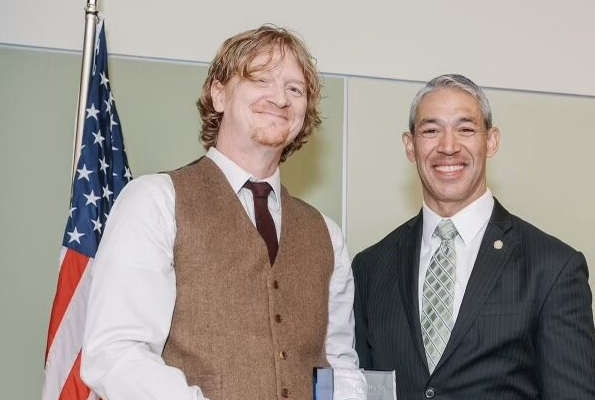The assistant professor is helping launch a new community health program.
From working with indigenous Mayan midwives to curating health and wellness exhibitions to chairing
the Mayor’s Fitness Council, Dr. Bryan Bayles brings an eclectic background to his role at A&M-San
Antonio.
As an assistant professor, Bayles not only teaches classes in global and community health, but he’s also
helping spearhead the University’s growing research and teaching initiatives, most notably with the new
Community Health program.
The path that led Bayles to the University is one full of interesting twists and turns. Armed with a Master
of Arts and pursuing a Doctor of Philosophy at the University of Missouri-Columbia, Bayles in the 1990s
started working with indigenous Mayan communities in Chiapas, Mexico, near Guatemala.
Fascinated with Mayan archeology and linguistics, he connected with a Mayan family, including a woman
who served as a midwife and healer.
Intrigued by this kind of “medical anthropology,” Bayles next worked for UT Health San Antonio as the
assistant director of the Center for Integrative Health and a professor in the Department of Family and
Community Medicine. He was responsible for the development, implementation and evaluation of
community health programs, as well as research and educational opportunities for students relating to
folk healing and integrative medicine, including working with traditional healers (curanderos) throughout
South Texas and the Border Region.
It was while Bayles was at UT Health that the Witte Museum asked him and a few other medical school
employees for advice on creating a health and wellness exhibition.
“I was really excited about this project and told the CEO that if she ever needed someone to help drive the train on this, I’d love to do it.”
Bayles parlayed this opportunity into serving as the museum’s curator of anthropology and health. In this
role, he worked with community members and city officials to oversee the planning and development of
the H-E-B Body Adventure Powered by University Health System, a four-story, indoor-outdoor interactive
experience promoting health, wellness, and mind-body balance. In coordination with the San Antonio Metro Health District, the exhibit, through various gamified activities, collected anonymous data, such as eating habits, physical activity, age and ZIP code.
“It was essentially public health surveillance conducted in a museum setting, which had never really
been done before,” Bayles said.
Bayles and his team were able to use this data to create health and wellness maps of the city, which
highlighted many of the disparities in San Antonio. Bayles said you could essentially draw a line through
the center of Bexar County, and the South Side consistently had comparatively poor health outcomes,
including a lack of fruit and vegetable consumption and a sedentary lifestyle. Moreover, other data from the city showed that there is as much as a 20-year difference in life expectancy in South San Antonio compared to ZIP codes in the northern parts of the city.
“After looking at all those maps, I really wanted to be where the greatest health needs were,” Bayles
said.
This desire eventually led Bayles to A&M-San Antonio, where he started in 2020. “Working at the
museum was great, but I missed teaching students,” he said.
As an assistant professor, Bayles is helping spearhead the University’s new Community Health program,
where he’s serving as interim director. Housed in the College of Arts and Sciences, the undergraduate
program enables students to train in the concepts of public health, with the idea of catering to the needs of the region and the state.
The four-year program works in conjunction with Texas A&M’s Master of Public Health program, both of which focus on the study of disease distribution, causes and control. In addition to his role at the University, Bayles is also chair of the San Antonio Mayor’s Fitness Council. The two positions dovetail nicely as they enable Bayles to explore what he says is a fundamental shift in how people think about health.
“If you’re sick or injured, like with a broken leg or heart attack, the U.S. has a wonderful medical system
in place that can take care of you,” Bayles said, “…as long as you have the money and health insurance.”
“We’ve put way less resources into prevention. But we’re starting to realize that health has less to do
solely with medicine and surgery and more to do with access to stable housing, healthy food,
opportunities for physical activity and other social determinants of health.”
Bayles said he’s working on several health and wellness initiatives that tap into this way of thinking that
benefits both the University and the region. This includes a project he just wrapped up with Dr. Megan
Wise de Valdez, a biology professor and chair of the Department of Natural Sciences.
The project focused on using data detailing how often people used San Antonio’s greenway trails. The
city has mounted motion detection cameras around some of the 80 miles of local nature trails, which
can differentiate between pedestrians and bicycles. The cameras generated lots of data, and Bayles used
that information to introduce research skills to biology and public health undergraduate students.
“They analyzed the data and made correlations between factors like temperature and time of day with
trail usage. Students can develop research projects based on this information and integrate them into
their classes.”
Bayles said this most recent project is a good example of how his teaching duties, coupled with his
involvement with the Mayor’s Fitness Council has enabled him to better connect with his students.

“I’m able to share interesting educational opportunities that are happening in the city, and they share important information with me based on their own lives and experiences. We’re exchanging ideas and starting a dialogue. In the process, my students are learning but also becoming more civically engaged and giving back to the city.”